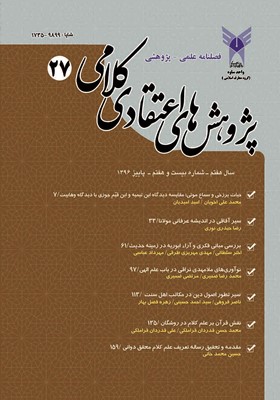نوآوری¬های ملا مهدی نراقی در باب علم الهی
محورهای موضوعی : کلام اسلامیمحمد رضا ضمیری 1 , مرتضی ضمیری 2
1 - دانشگاه پیام نور قم
2 - مرکز تخصصی شیعه شناسی حوزه علمیه قم
کلید واژه: مهدی نراقی, کلام, نوآوری, ثبوت علم الهی, کیفیت علم الهی ,
چکیده مقاله :
بی شک مساله ی علم الهی یکی از مهم ترین و پیچیده ترین مباحث در علم کلام و فلسفه ی اسلامی است. متکلمان و فلاسفه اسلامی در ابعاد مختلف علم الهی از جمله چگونگی اثبات و کیفیت آن، تقریرها و استدلال های مختلفی بیان نموده اند و ملامهدی نراقی در این دو بخش نظرات بدیعی را ارائه نموده که تا پیش از او مطرح نبوده است. سوال اصلی در این مقاله آن است که اندیشه های نوین ملامهدی نراقی در استدلال بر اصل علم الهی و کیفیت آن چیست؟ پس از بحث و بررسی آثار مختلف نراقی از جمله اثر جامع الافکار و ناقد الانظار، با روش کتابخانه ای به نتایج زیر دست یافتیم: اول: صحیح ترین وجه در اثبات اصل علم الهی بر مبنای قاعده ی "کل مجرد عاقل لذاته" این است که هر موجود مجرد قائم بذاته، امکان ادراک و تعقل را داراست اما فعلیت تعقل در آن منوط به تحقق قوی ترین علاقه ی موجود بین عاقل و معقول است که آن هماناحضور ذات نزد ذات (علم حضوری) است. دوم: در بحث کیفیت علم الهی دیدگاه برتر آن است که مناط علم تفصیلی پروردگار به جمیع اشیاء چه قبل و چه بعد از ایجاد مشمولیت و معلولیت تمامی موجودات برای علة العلل و حضور و انکشاف تام آنها به مناط حضور ذات الهی نزد ذاتش می باشد که به مراتب حضور واجب نزد ذاتش از حضور خود اشیاء نزد واجب متعال أقوی است.
It is beyond a shadow of a doubt that the issue of Devine knowledge is one of the most important and complicated issues in Islamic theology and philosophy. Islamic theologians and philosophers have engaged in various aspects of this issue, including how to prove and quality of that, and present different arguments. Mulla Mahdī Narāqī was one of the great figures who has discussed regarding two above-mentioned aspects of Devine knowledge and innovated new ideas. The quality and argument in favor of Devine knowledge in the view of Narāgī, are the main questions which this paper concentrate on. Analyzing several books of Narāgī, such as Jami' al-Afkār wa Nāqid al-Anzār, we came to following conclusions: First: The correct aspect of proving omniscience upon the "Any unphysical entity is thinker of itself" rule would be that any unphysical entity which stands on its essence has the capacity of perception and thinking. But actuality of thinking is subordinated to actuality of the most powerful interest between thinker and which has been thought, and that would exactly be the presence of its essence in its essence, that is knowledge by presence. Second: for the quality of omniscience, the best view would be that to make the presence of god's essence in its essence the criterion of God's detailed knowledge to all entities, even before as after creation. It is the total presence and all discovering for all entities, in their inclusion and causality. The presence of God in its essence is more powerful than the presence of entities to God.
1. قرآن کريم
2. ابن سينا، حسين بن عبدالله،(1404ق)، التعليقات، بيروت، الاعلام الاسلامي.
3. بحراني، ابن ميثم، (1406ق)، قواعد المرام في علم الکلام، قم، کتابخانه مرعشي نجفي، چاپ دوم.
4. بهمنیار، ابن مرزبان،(1375ش)، التحصیل، تهران، دانشگاه تهران، چاپ دوم.
5. جرجانی، میر سید شریف،(1412ق)، التعریفات، تهران، ناصر خسرو، چاپ چهارم.
6. حلی(علامه حلی)، حسن بن یوسف،(1413ق)، کشف المراد فی شرح تجرید الاعتقاد، قم، اسلامی، چاپ چهارم.
7. سهروردی(شیخ اشراق)، شهاب الدین، (1373ش)، حکمة الاشراق، تهران، مطالعه و تحقیقات فرهنگی، چاپ دوم.
8. شهرزوری، شمس الدین، (1372ش)، شرح حکمة الاشراق، تهران، مطالعه و تحقیقات فرهنگی، چاپ اول،.
9. شهرستاني، محمد بن عبدالکريم،(1364 ش)، الملل و النحل، قم، الشريف الرضي، چاپ سوم.
10. همو، (1425ق)، نهایة الاقدام فی علم الکلام، بيروت، دارالکتب العلميه، چاپ اول.
11. شیرازی، صدرالدین محمد(ملاصدرا)، (1981م)، الحکمة المتعالیة فی الاسفار العقلیة الاربعة، بیروت، دار احیاء التراث، چاپ سوم.
12. همو،(1360 ش)، الشواهد الربوبيّه في المناهج السلوکية، مشهد، المرکز الجامعي للنشر، چاپ دوم.
13. همو،(1354 ش)، المبدأ والمعاد، تهران، انجمن حکمت و فلسفه ايران.
14. طباطبايي، محمد حسين، (1386 ش)، با تعليق فياضي، نهاية الحکمة، قم، مؤسسه امام خميني (ره)، چاپ چهارم.
15. طوسي، محمد بن محمد بن الحسن (خواجه نصير طوسي)، (1405ق)، تلخيص المحصل، بيروت، دارالاضواء، چاپ دوم.
16. همو،(1383 ش)، اجوبة المسائل النصيريّة، اجوبة مسائل علي بن سليمان البحراني، شرح رساله مسألة العلم، تهران، پژوهشگاه علوم انساني، چاپ اول،.
17. همو،(1375ش)، شرح الاشارات و التنبيهات، قم، بلاغت، چاپ اول.
18. لاهيجي، عبدالرزاق، شوارق الالهام في شرح تجريد الکلام، اصفهان، مهدوي، چاپ اول، بيتا.
19. لاهيجي، فياض، (1383ش)،گوهر مواد، تهران، سايه، چاپ اول.
20. مظفر، محمدرضا، (1375 ش)، فلسفه و کلام اسلامي، ترجمه محمد محمدرضايي، ابوالفضل محمودي، قم، دفتر تبليغات اسلامي، چاپ اول.
21. نراقی، مهدی، با مقدمه حسن نراقی و تصحیح سید جلال الدین آشتیانی،(1357ش)، اللمعة الالهیة، تهران، انجمن فلسفه.
22. همو،(1381ش)، جامع الافکار و ناقد الانظار، تصحیح: مجید هادی زاده، تهران، حکمت، چاپ اول.
23. همو،(1381 ش)، اللمعات العرشية، کرج، عهد، چاپ اول.
.

